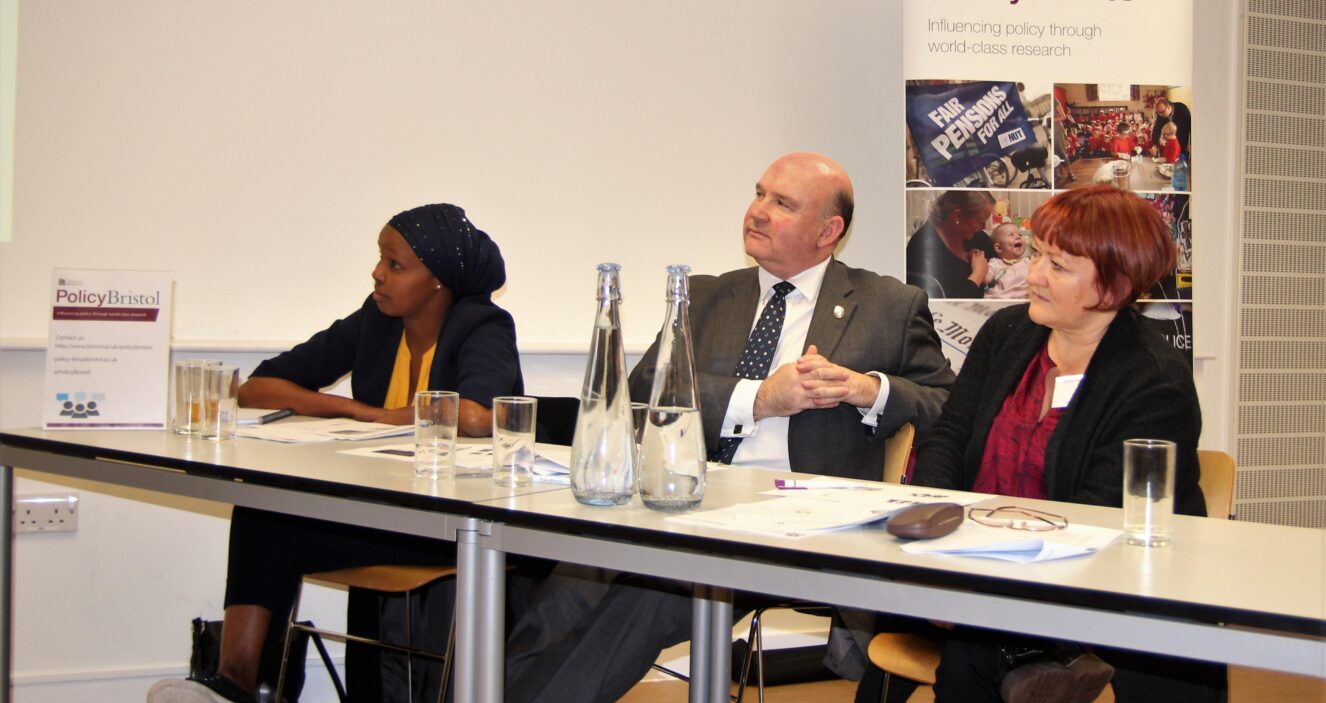How can we build closer working relationships between academics and policymakers?
The evidence points towards using a relational approach – building long-term and trusting relationships between individuals. Our second Policymakers’ Question Time event, held on 7 November with an invited audience of policymakers and academics, aimed to spark new connections and bridge the gap between research and policy.
We were pleased to welcome Bristol East MP Kerry McCarthy, Director of Black South West Network Sado Jirde, and Metro Mayor Tim Bowles as our panel members. The panel provided engaged and incisive questions to our four speakers, whose diverse subject areas reflected the breadth and complexity of policymakers’ roles.
Following a warm welcome from Deputy Vice-Chancellor and Provost Guy Orpen, Professor Andrew Sturdy presented his research on the use and effectiveness of management consultants. His finding that external management consultants lower the efficiency of NHS services provides thought-provoking evidence for all levels and types of public service. In the year of the 70th anniversary of the NHS, questions over budget pressures continue to amplify. The research implies that existing procedures for procuring consultants, as well as the circumstances within which they are used, should be reviewed, and evaluations of their effectiveness carried out by impartial stakeholders. The panel was keen to find out about cross-country comparisons in use and effectiveness of management consultants, and the role of research in ensuring accountability. The possibility of using internal forms of management consultancy was also discussed.
Sara Davies spoke next, presenting the work of the Personal Finance Research Centre on the Poverty Premium. This continues to be a topical policy issue in a climate of austerity which is disproportionally impacting locally, regionally and nationally on the UK’s most disadvantaged communities. Posing the question of whether markets service the needs of low-income households, the role of government, policy, regulation and business was debated. The role of fintech – and dangers of excluding some populations by using it – were discussed, and possible policy options including supporting social enterprise and regulatory changes, acting on the need for a holistic approach, and encouraging businesses to disrupt existing markets were put forward.
The power of stories was emphasised by our third speaker, Dr Stephen Mawdsley, who drew on historical evidence around the use and impact of Jamaica Ginger, a highly alcoholic and, following a recipe change, toxic ‘cure-all’ marketed in the United States during the prohibition era. Drawing parallels with issues for alcohol and drug policy today, there was lively debate around the role and impact of education, robust regulation and government oversight in our current context, and the value of looking to history for guidance on ‘what works’ (and doesn’t) for policy. Stephen commented, “I enjoyed sharing my research with policy-makers and showing them how history can be used to better understand present day concerns.”
Our final speaker Professor Matthew Avison highlighted the risks of putting policy before evidence, with his discussion of the role of animals in the development of antimicrobial resistance in humans. Policy attention is currently focused on reducing the use of antibiotics in farming; but the evidence suggests that this is in fact not the most important issue to address, as overuse of antibiotics in humans and human-pet interactions are likely to have a more significant effect on antimicrobial resistance in humans. Prof. Avison emphasised that government funding has enabled research on this issue that should have been carried out long ago; and discussions concluded with the importance of staying up to date with research on this issue, where the evidence about the cause of antimicrobial resistance is both new and challenging long-held views.
Kerry McCarthy MP commented, ‘‘It was fantastic to have the opportunity to hear about some of the fascinating research from Bristol’s academics as part of this event. Evidence should be at the heart of policy making, and it is great that the University of Bristol is leading the way in innovative research on a range of key issues.”
The PolicyBristol team found our panel’s final comments about the value of research in ensuring scrutiny and accountability of decisions, the advantages of looking at complex policy problems from multiple perspectives, and the usefulness of having time to focus on one area in a bit of depth instructive. We are looking forward to using these and other comments to inform our future events.



